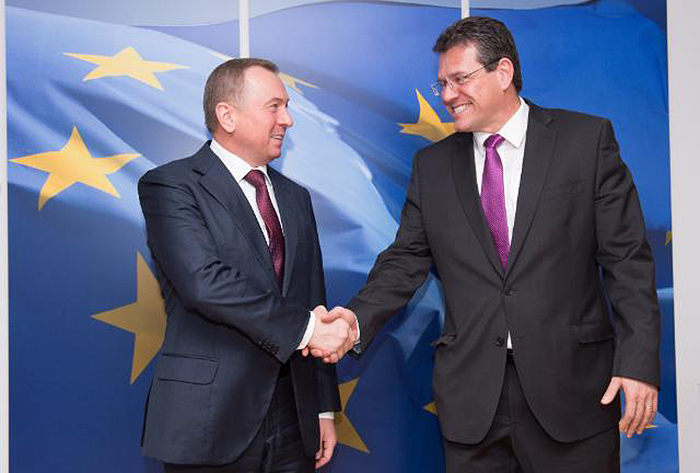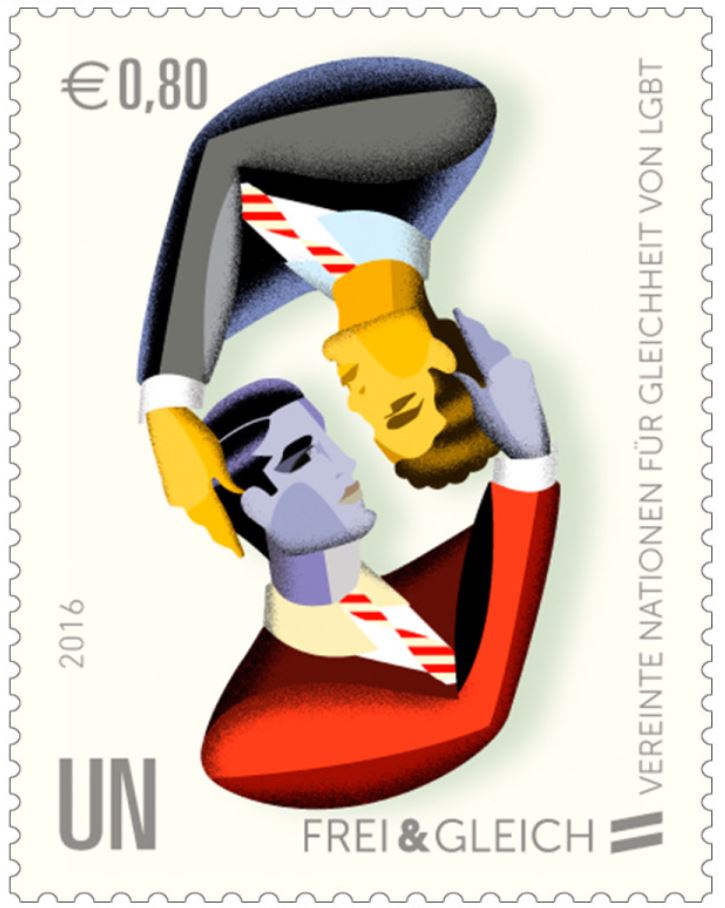Fighting for the Traditional Family: Values over Pragmatism – Belarus Foreign Policy Digest

Ptotocol officials meet Lukashenka in Rome - Photo president.gov.by
In May, Belarus fought another battle for the traditional family at the UN, even if its stance on the issue antagonises the West and finds little international support outside of the Islamic world.
The country maintained an active dialogue with Europe but mostly at a working level. Unlike in previous months, not a single European foreign minister visited Belarus.
Belarusian foreign minister Vladimir Makei met high-level EU officials only in the framework of multilateral events. Government-run media tried to present President Alexander Lukashenka’s audience with Pope Francis as a breakthrough visit to Italy.
Minsk continued to use means of questionable efficiency, such as obtaining observer status in exotic organisations, to develop its relations with developing countries.
Relations with Europe stuck at working level
On 4 May, Foreign Minister Vladimir Makei travelled to Prague to participate in a meeting of foreign ministers of the Visegrád Group and the Eastern Partnership countries. On 23 May, he visited Brussels to attend the annual Eastern Partnership ministerial meeting.
There, Belarus fostered the ongoing reformatting of the Eastern Partnership leading to a greater emphasis on trade, investment and development projects.
In addition to his encounters on the sidelines of the events, in Prague Makei held formal meetings with his Czech counterpart Lubomir Zaorálek and European Commissioner Johannes Hahn. In Brussels, he talked to Maroš Šefčovič, the Vice-President of the European Commission in charge of the Energy Union.
The meeting  was warranted by the current crisis in relations between Belarus and Lithuania caused by their disagreements over the construction of the Belarusian nuclear power plant near their shared border. Belarus is seeking to counter Lithuania’s efforts to secure greater involvement of the EU in this issue.
was warranted by the current crisis in relations between Belarus and Lithuania caused by their disagreements over the construction of the Belarusian nuclear power plant near their shared border. Belarus is seeking to counter Lithuania’s efforts to secure greater involvement of the EU in this issue.
At working level, Belarus held meetings of the bilateral commissions on economic cooperation with Romania and the Czech Republic in Minsk and with France in Paris. On 17 May, mid-level diplomats from the Benelux countries met Makei and his deputy Alena Kupchyna in Minsk. Three days later, Kupchyna travelled to Riga for political consultations with Latvia’s foreign ministry.
On 24 May in the Austrian capital, the Belarusian government organised the Vienna Forum: Promoting EU Investments to Belarus. Ninety business executives from ten EU countries, thirty Belarusian entrepreneurs and several Belarusian and EU officials attended the event.
First deputy prime minister Vasily Matyushevsky, who led the Belarusian delegation in Vienna, stressed that Belarus and the EU were “hearing each other” and highlighted the “mood of openness and mutual understanding” in their relations. Matyushevsky promised to reveal at a later point “numerous deals” reached in Vienna. However, no specific results of the forum have been made known so far.
Stopover in Italy on way to see the Pope
Belarusian state-run media tried hard to sell Lukashenka’s trip to Rome on 20 and 21 May as a resumption of top-level contacts with Europe after the removal of the sanctions.
 In fact, this trip should not be perceived in this context. Rather, it was a long-sought audience with the Pope complemented by a perfunctory meeting with an Italian ceremonial official. Tellingly, even the official communiqués about the “visit to Italy” failed to define its status – state, official or working. So, it had none.
In fact, this trip should not be perceived in this context. Rather, it was a long-sought audience with the Pope complemented by a perfunctory meeting with an Italian ceremonial official. Tellingly, even the official communiqués about the “visit to Italy” failed to define its status – state, official or working. So, it had none.
Seven years ago on 27 April 2009, on a similar trip to Rome, Lukashenka talked to Silvio Berlusconi, the powerful then-Prime Minister, for more than three hours over a late-night dinner. This time, he was entitled only to a 50-minute encounter with President Sergio Mattarella, whose role in Italy’s political sphere is strictly ceremonial.
Prime Minister Matteo Renzi, Italy’s de facto number one, failed to meet the Belarusian leader. Lukashenka’s meeting with Mattarella was a face-saving solution, accommodating his visit to the Vatican to see Pope Francis.
Exotic and traditional ways to befriend the developing world
Belarus uses means of questionable efficiency when seeking to increase its exports to the “Remote Arc” counties. One of them is the quest for observer status in various organisations that regroup predominantly developing countries.
On 17 May, Belarus obtained such status at the Asian-African Legal Consultative Organisation, through which it hopes to “expand its ties and the international treaty framework with Asian and African countries”.
Earlier, Belarus was granted observer status at the Association of Caribbean States, the Shanghai Cooperation Organisation and the Conference on Interaction and Confidence-Building Measures in Asia. Meanwhile, there is no evidence that greater involvement in the work of such specialised and often exotic organisations has helped to increase Belarusian exports to developing countries.
Fortunately, the traditional forms of developing cooperation with the “Remote Arc” countries are still on the agenda. On 3–4 May, Belarus and Iran held a meeting of their joint economic commission in Minsk. On 17– 19 May, Belarusian government agencies welcomed a representative Saudi delegation for a similar event in Minsk.
 On 25 May, Belarusian and South Korean officials met under the format of the economic cooperation commission in Minsk. Contact with developing countries also included a visit by a deputy minister for industry from Syria and political consultations with Mozambique.
On 25 May, Belarusian and South Korean officials met under the format of the economic cooperation commission in Minsk. Contact with developing countries also included a visit by a deputy minister for industry from Syria and political consultations with Mozambique.
On 23 May, Miguel Diaz-Canel Bermúdez Mario, the second person in the official Cuban hierarchy, paid a working visit to Minsk where he met Lukashenka and Prime Minister Andrei Kabiakou. Belarus is seeking to maintain and develop its strong relationship with Cuba in the changing context of the island’s international relations.
All these meetings focused heavily on developing trade with the “Remote Arc” countries, with the traditional emphasis made on promoting sales of Belarusian heavy machinery but also on cooperation in education, research and high technologies.
Protecting conservative values at the UN
At the United Nations, Belarusian diplomats have continued to fight for the traditional (or, as Belarus’ MFA puts it, “natural”) family.
On 16 May, deputy foreign minister Valentin Rybakov presented the programme statement of the Group of Friends of the Family at a special high-level event at the UN headquarters in New York.
Belarus, together with Egypt and Qatar, founded the Group in early 2015. Currently, it counts twenty-five UN members, almost exclusively Muslim countries. Belarus is its only European member.
 Despite the Group’s strong rejection of same-sex unions, the joint statement initiated by Belarus avoids using confrontational language. However, it invites the UN agencies and officials “to refrain from any inherent controversial actions that depart from the widely accepted family concept”.
Despite the Group’s strong rejection of same-sex unions, the joint statement initiated by Belarus avoids using confrontational language. However, it invites the UN agencies and officials “to refrain from any inherent controversial actions that depart from the widely accepted family concept”.
Belarus is well aware that liberal democracies are bound to strongly oppose the concept of the traditional family promoted by the Group. These UN stakeholders are working to withdraw the theme of the family from the UN agenda.
Speaking at an NGO-sponsored dinner on 18 May in New York, Rybakov confided Belarus’ desire to convene a Family Summit in September in New York. One wonders who will fund this event given its absence from the UN agenda.
Belarus wants the summit to adopt a non-consensual declaration on the family, by which the Group and like-minded countries will oppose the “moral relativity, permissiveness and unashamedly homocentric perspective on [the] world”.
It seems that the Belarusian authorities are unwilling to abandon the advocacy of the conservative values shared by most Belarusians even if this would help to further improve relations with the West.






